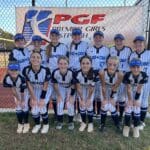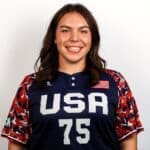

The Coronavirus pandemic may have limited travel in much of the world, but in December eight American players and two coaches were able to fly to Panama and experience the country, culture and softball in what each will remember as a “softball trip of a lifetime.”
From white softballs to 52-year-old opposing pitchers, laid-back fun to constant music during games, the United States athletes—who ranged from high schoolers to Power 5 seniors—got to rub elbows with local Panamanian athletes who could someday be their teammates on the country’s national softball team.


The genesis of the international experience dates back a year ago when José L. Tuñón, the President of the Georgia Academy Softball/Baseball Club and Head Coach of Georgia Power 2004, was online and had something catch his eye on social medial.
“I saw where Gabby Moreno, the talented Texas A&M senior, had played in a fastpitch softball tournament in the Republic of Panamá over her Christmas break. I reached out to Danilo Velasco, President of the Panamanian Softball Federation (FEPASOFT), and through WhatsApp started to build a relationship and find out more information about the Panamanian National team and their needs.”
It wasn’t Tuñón’s first involvement with the country that links Central and South American.
“I was fortunate to be a part of the Panamanian Jr. National team in 1987 where we played in Windsor, Ontario, Canada against the top teams in the world,” the current Georgia resident recalls. “This was the best experience of my athletic life and I wanted my daughters, Sofia and Victoria, to experience international play and see the world.”
Today, Panamá is ranked #52 in the World Baseball Softball Confederation but, believes Danilo, the “National softball team lacks pitchers that have the ability to shut down a lineup as it turns over two or three times. The hitting, fielding and baserunning is competitive but without quality pitching, competing at the highest level is difficult in international play.”
The Panamanian Softball Federation leader asked Tuñón if he would help spread the word in the United States that the country was looking for players of Panamanian descent who have, or could obtain, a passport and would be interested in representing Panamá internationally.
Tuñón subsequently reached out to the National Fastpitch Coaches Association (NFCA) and was granted permission to post a classified in the organization’s monthly newsletter announcing the search for players. The club coach and org leader also posted several online messages on softball bulletin boards to see if anyone would respond back with interest.


Slowly, several parents—with the same shared interest in seeing their daughters compete internationally—began reaching out. Tuñón identified eight players who were interested in the opportunity and had the talent to play at that level. Of the eight from the U.S., he noted, there were three “very talented pitchers who complemented each other nicely.”
Danilo, with input from Tuñón, invited the young athletes to participate in the “Torneo Superior Femenino de softbol” in Panamá City, Panamá held in mid-December 2020. The tournament was an “open” event that included five teams fielding local Panamanian players from all nine provinces.
The tournament would be used as a tryout to begin assembling the 2021 Panamanian Jr. and National Teams. The games were played at MVP Sports City, a facility owned by former Major League Baseball player, Bruce Chen.
Explains Tuñón of the tournament and the details of it:
“The MVP Sports City facility is one of the most beautiful, state-of-the-art facilities in the Western hemisphere and the girls were separated into each of the local teams to play five games in addition to an additional exhibition game between the Panamanian All-Stars and the players from the United States.”
Another key figure instrumental in helping the trip come to fruition was Armando Moreno, Gabby’s father, who is a United Airlines pilot. He made several trips to Panamá to ensure the accommodations were top-notch for the families coming from the United States and “without him,” stresses Tuñón, “this trip would not have been possible.”
Tuñón asked to be the assistant coach of the “Juvenil” team (which loosely translated means Junior team) but found that his opponents sometimes were anything but junior.


“One opposing pitcher was 52 years old, a crafty and tricky pitcher who has represented Panamá on various occasions in international play” a bemused Tuñón recollects. “She took a comebacker off her leg, casually picked up the ball and threw the hitter out at first. After the play, she didn’t need medical attention and was smiling from ear to ear as if nothing had occurred.”
“I asked her after the game if she was OK after taking the hard-hit ball off her leg and her response was indicative of the passion the Panamanian players have for the game.”
“She said, ‘I love this game and will continue to play it as long as the Lord gives me strength. The day I stop playing is the day my legs and arms will hurt. As long as I am playing the game that I love, comebackers won’t ever hurt me!’”
“The worldwide pandemic created travel and other challenges regarding the viability of the tournament,” the coach concludes, “but we were still so blessed to have been able to play on Panamanian soil and give these players the opportunity of a lifetime.”
“We are ever grateful to Danilo Velasco and Armando Moreno for working tirelessly to make this trip happen for our families and their players and thank the host families for their amazing hospitality in opening their hearts to our U.S.-based players.”
Here are comments, recollections and remembrances from many of the U.S. players and what they loved about their trip to Panama.
Also, join us later this week for a day-by-day blog from one of the athletes, Kayla Fekel…













